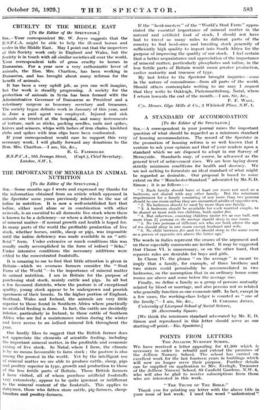A STANDARD OF ACCOMMODATION
[To the Editor of the SPECTATOR.] Sin,—A correspondent in your journal raises the important question of what should be regarded as a minimum standard of housing accommodation. The record of the Spectator in the promotion of housing reform is so well known that I venture to ask your opinion and that of your readers upon a standard which we are disposed to adopt in our Survey of Merseyside. Standards may, of course, be advanced as the general level of achievement rises. We are here laying down strictly minimum conditions for health and decency. We are not seeking to formulate an ideal standard of what might be regarded as desirable. Our proposal Is based to some extent on the " Manchester Standard" advocated by Mr. E. D. Simon ; it is as follows :—
" 1. Each family should have at least one room not used as a bedroom, not shared with any other family. But the minimum requirement for a family consisting of not more than two persons should be one room unless they are unmarried adults of opposite sex.
"2. No bedroom should be used by more than one family.
"3. A bedroom should be available for each married couple, to be shared at most with two children, both under five.
"4. But otherwise, counting children under ten as one half, not more than 2i persons on the average should sleep in one room. "5. No two persons of different sex who are both above the age of ten should sleep in one room except husband and wife. " 6. No child between five and ten should sleep in the same room as a person of opposite sex above the latter age.'
The words in italics represent the cruces of the argument and on these especially comments are invited. It may be suggested that Clause VI. is unnecessary, or on the other hand, that separate rules are desirable for boys and girls.
In Clause IV. the phrase "on the average" is meant to imply that a family, for example, of three brothers and two sisters could permissibly be accommodated in two bedrooms, on the assumption that in an ordinary house some rooms are above and some below the average size.
Finally, we define a family as a group of persons mutually related by blood or marriage, and also persons not so related who generally function as one economic unit. In fact, except in a few cases, the working-class lodger is counted as "one of 26 Abercromby Square.
[We think the minimum standard advocated by Mr. E. D. Simon and reproduced in this letter should serve as our starting-off point.—En. Spectator.]


















































 Previous page
Previous page